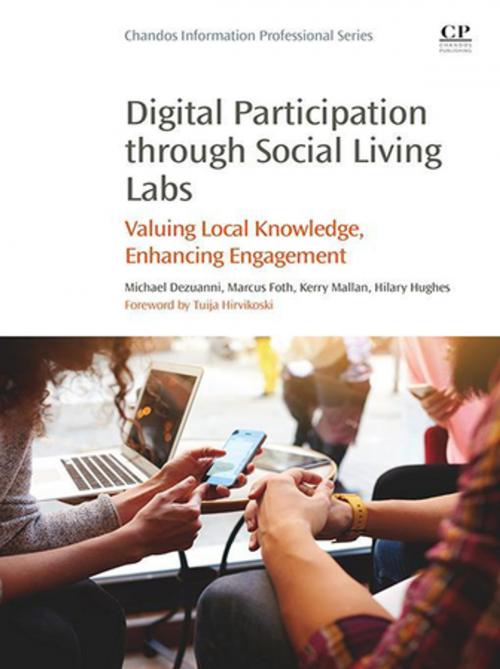Digital Participation through Social Living Labs
Valuing Local Knowledge, Enhancing Engagement
Nonfiction, Reference & Language, Language Arts, Library & Information Services, Reference| Author: | ISBN: | 9780081020609 | |
| Publisher: | Elsevier Science | Publication: | August 14, 2017 |
| Imprint: | Chandos Publishing | Language: | English |
| Author: | |
| ISBN: | 9780081020609 |
| Publisher: | Elsevier Science |
| Publication: | August 14, 2017 |
| Imprint: | Chandos Publishing |
| Language: | English |
Digital Participation through Social Living Labs connects two largely separate debates: On the one hand, high speed internet access and associated technologies are often heralded as a means to bring about not only connectivity, but also innovation, economic development, new jobs, and regional prosperity. On the other hand, community development research has established that access by itself is necessary but not sufficient to foster digital participation for the broadest possible range of individuals.
Edited by leading scholars from the fields of education, youth studies, urban informatics, librarianship, communication technology, and digital media studies, this book is positioned as a link to connect these debates. It brings together an international collection of empirically grounded case studies by researchers and practitioners from diverse backgrounds. They advance knowledge that fosters digital participation by identifying the specific digital needs, issues and practices of different types of communities as they seek to take advantage of access to digital technologies. Collectively, these cases propose new ways for enabling residents to develop their digital confidence and skills both at home and in their local community, particularly through a ‘social living labs’ approach. The book is organised around key focus areas: digital skills enhancement, youth entrepreneurship, connected learning, community digital storytelling, community-led digital initiatives and policy development.
- Highlights that high speed internet is necessary that high speed internet access is necessary but not sufficient to resolve digital divides and foster social inclusion;
- Brings together international, empirically grounded case studies to identify digital needs, issues and practices of different communities, and contextualises these with expert comment;
- Presents contributions from multiple disciplines, with most chapters incorporating more than one disciplinary background;
- Gives insight on the place of the digital in contemporary society;
- Illustrates the innovative potential of social living labs to foster digital learning and participation in a variety of community contexts.
Digital Participation through Social Living Labs connects two largely separate debates: On the one hand, high speed internet access and associated technologies are often heralded as a means to bring about not only connectivity, but also innovation, economic development, new jobs, and regional prosperity. On the other hand, community development research has established that access by itself is necessary but not sufficient to foster digital participation for the broadest possible range of individuals.
Edited by leading scholars from the fields of education, youth studies, urban informatics, librarianship, communication technology, and digital media studies, this book is positioned as a link to connect these debates. It brings together an international collection of empirically grounded case studies by researchers and practitioners from diverse backgrounds. They advance knowledge that fosters digital participation by identifying the specific digital needs, issues and practices of different types of communities as they seek to take advantage of access to digital technologies. Collectively, these cases propose new ways for enabling residents to develop their digital confidence and skills both at home and in their local community, particularly through a ‘social living labs’ approach. The book is organised around key focus areas: digital skills enhancement, youth entrepreneurship, connected learning, community digital storytelling, community-led digital initiatives and policy development.
- Highlights that high speed internet is necessary that high speed internet access is necessary but not sufficient to resolve digital divides and foster social inclusion;
- Brings together international, empirically grounded case studies to identify digital needs, issues and practices of different communities, and contextualises these with expert comment;
- Presents contributions from multiple disciplines, with most chapters incorporating more than one disciplinary background;
- Gives insight on the place of the digital in contemporary society;
- Illustrates the innovative potential of social living labs to foster digital learning and participation in a variety of community contexts.















